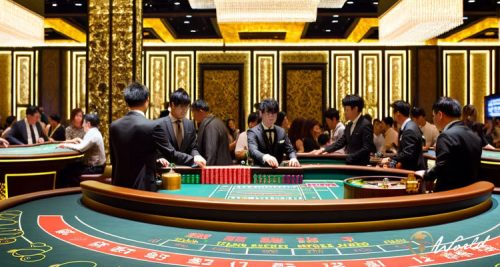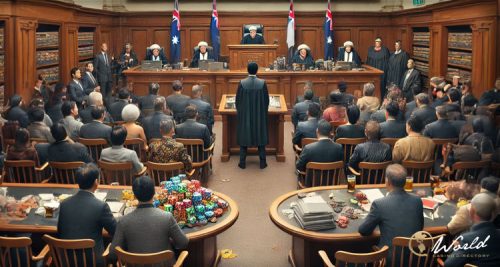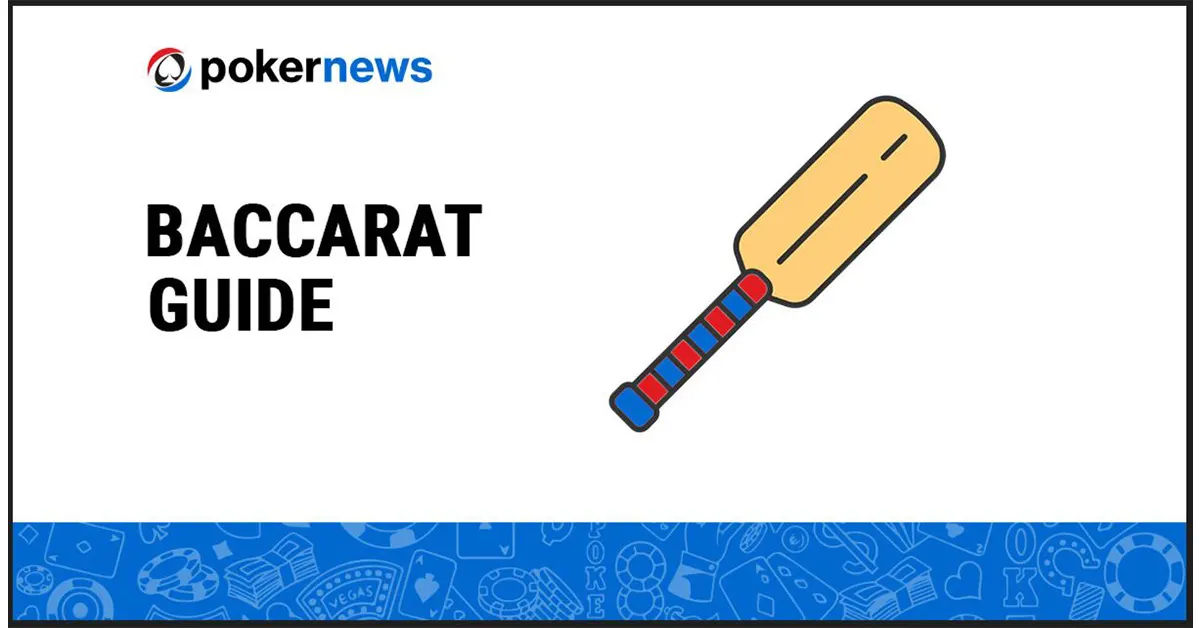Gambling: Big Time Baccarat
A dealer asks Lou if he has ever tried baccarat before. Lou acknowledges that he has no idea how the game works, although he's seen it played and been intrigued by its rituals and Bond-dipped mystique.

| | From Don Johnson, Mar/Apr 02
Baccarat Blogs
Gambling: Big Time Baccarat
Lou is a big guy with a big bankroll. He's used to visiting Las Vegas casinos and being schmoozed by hosts, set up with fight tickets and gifted with TV sets and automobiles on his birthday. Lou likes the action and he digs the vibe -- especially in the high-limit rooms around town, where minimum bets are $100, the Scotch is smooth and the cigars are aged. Over the years, he has established himself as a serious blackjack player. He puffs hard on his Montecristos, bets big, employs basic strategy and enjoys the game's streaky nature.
On this quiet night he sits at the Hard Rock Café's Peacock Lounge, taking a breather between hands of blackjack and grooving to the booming beats that sonically define the casino's high-roller enclave. A dealer asks Lou if he has ever tried baccarat before.
Lou acknowledges that he has no idea how the game works, although he's seen it played and been intrigued by its rituals and Bond-dipped mystique. That night, he discovers baccarat possesses a beautiful Zen-like minimalism: you bet on player or banker (a term that is purely symbolic) and the side that gets closest to nine (picture cards and 10s count as zero, aces are one) is the winner.
The player and banker each get dealt two cards; the player always goes first and draws a third card if the first two cards total from zero to five. The banker may or may not draw a third, depending on the player's total and the banker's first two cards. However, the banker always gets a slight advantage over the player (in terms of his drawing situations), and, in exchange for that, the banker pays a 5 percent commission on every win. There is a third bet as well: wagering that the two hands of cards will tie. It pays 8-to-1, but an expert gambler I know points out that the real odds are 15-to-1 and that "it is one of the five worst bets in a casino." However, this does not stop countless baccarat aficionados from laying down money on the poorly valued long shot. Apparently, in a game that seems to be based on hunches and irrational trends, they can't keep themselves from placing big bets on the highest paying hunch of all.
On this night, as Lou becomes initiated into the brotherhood of baccarat, he quickly realizes that the game's surface simplicity is deceiving. Blessed with a mathematical mind, he immediately likes the way players keep track of winning hands, using black ink to denote player victories and red ink for banker's. Players sketch in little rectangles and track scores so obsessively that the sheets look like studies for big two-toned abstract artworks. Sometimes Lou and the other players save their cards, study them in hushed quorums and scrutinize them for information that will provide an edge next time.
These days, 18 months after first being exposed to baccarat, Lou has filled in many cards. He sketches and bets with the best of them. Employing some of the same skills that once made him a gifted options trader, he keeps an eye out for trends, riding dips and rises with the gameness of a big wave surfer who skitters from one life-threatening curl to the next. "You look at the patterns that develop," says Lou. "And you jump on them for as far as they'll take you."
It is the day after a long night of play at the Hard Rock. Lou's sitting at a big table in his stylishly posh, wood-paneled suite on the top floor of the new Palms Hotel and Casino. He's been given the kind of elite accommodations where anything seems possible, but you won't spend a night here unless you bet enough to make your presence worth wooing. Downstairs, in the high-rollers room, Lou made his presence so well known that a sign has been placed on the seat near the dealer (the center spot, which Lou prefers for its vantage point). It reads: Reserved for Lou.
"Last night I was hot because the patterns kept repeating," says Lou. "I think it is just totally random, but I can show you cards that go banker, player, banker, banker for 10 hands in a row. When you see these spreads you play them. When there is no pattern, it becomes an expensive game. That's when I bet low amounts and wait for the patterns to redevelop."
Other players lack Lou's patience. One guy who's been gambling with Lou tells me about his worst session at the tables. He'd been playing for three days and managed to get ahead by $170,000. "Then," he says, half bragging, half woeful, "I gave back the whole buck-70 in three hours. I got frustrated and started chasing the losses. Most people would be ecstatic to be up that much. I thought the cards would turn themselves around, so I pressed my bets and they just wouldn't hit." But don't feel too bad for this mega-roller. "My greatest night," he recounts with significantly more gusto, "was winning $290,000. What's really unbelievable, though, is that $210,000 came out of one shoe in 40 minutes. I have a high-paying job, but I can't make that kind of money at work. Unfortunately, though, I think this may have been as rare as Halley's Comet. I had 27 straight pattern payouts."
At the Hard Rock tonight, the situation is a modified version of that great run. Cards are hitting hard, players are high-fiving, sipping Corona beer and reaping rewards.
Lou has a fortress of yellow $1,000 chips stacked in front of him. A fresh shoe of cards is being prepared and the beautiful rituals of baccarat slowly unfold. It begins with six fresh decks being cracked open. Next, the cards are washed in beautiful swirls across the table. They are finally grouped together and loaded into the shoe.
Following much consideration and consultation, players lay down their bets on player or banker or tie, cards are dealt, and gamblers take turns looking at the two cards in totally idiosyncratic ways. Some slowly fold the cards up with choppy turns. Others tear the card as they expose it. Lou stabs his cards with the inky end of a ballpoint pen. He skewers the plastic and flips it up for all to see. At the end of each hand, used cards are permanently disposed of, making for tiny passion plays that always end with symbolic death as the spent cards get folded, spindled and mutilated.
Win, lose or draw, baccarat is a hell of an entertaining gamble, loaded with drama and symbolism. Considering all the flash and show, it's not surprising that the game was invented by somebody other than the guys who came up with, say, Red Dog and Caribbean Stud. Baccarat is of French descent and it dates back to the fifteenth century. The game from which it originates was dubbed chemin de fer -- with rules that require elevated risk and more decision making than baccarat does -- and was introduced stateside around 1900 in Saratoga, New York. American gamblers didn't take to the game and it returned to Europe, where it remained a beloved pastime of French and Italian noblemen. What's now called American baccarat actually originated in the United Kingdom, became the rave of pre-Castro Havana, and migrated to Las Vegas in the late 1950s. Though the game retains an aura of bygone elegance, in Vegas it's often played by men in chinos and Bermuda shorts and whatever else they feel like wearing as long as they've got the bankroll to withstand baccarat's brutal swings. (For the less well-heeled, mini baccarat, which is offered on the casino floor and is essentially the same game, requires much lower minimum bets.)
The high-limit players are not the only ones who fret over big swings of money -- the casinos do as well. One regular player recalls a heart-pounding session in which two Asian whales -- one from Taiwan, the other from mainland China, ideologically opposed, and situated in salon privés so that their paths would never cross -- were placing specially arranged $250,000-limit bets. Casino managers continually monitored the action and seemed to be sweating it more intensely than the players, who, in this case at least, might be better equipped to withstand the multimillion-dollar swings primed to occur every 10 minutes. But it can get even hairier than that.
Kerry Packer, the Australian media tycoon, dropped a reported $20 million during a a September 2000 stay at the Bellagio. In 1992, he raked in $9 million in one day from Caesars Palace, managing to win the casino's quarterly profits at the tables. Lucky for Caesars, though, Packer remained in town and played long enough and high enough to give back those winnings and then some. But even his mega-wagers can only put a dent in the long-term take that Las Vegas Strip casinos enjoy from baccarat, which, according to The Wall Street Journal, totaled $536 million in 2000.
But Packer is not baccarat's only iron man. Players with bankrolls that fail to rival those of casinos have been known to play for three days straight, to get virtual full-body massages alongside the baccarat table, to have casino bosses shuttling in chefs who cook gourmet meals that get consumed during play.
"Baccarat is a repetitive, seductive activity," says gambling historian Peter Ruchman, himself a veteran of many hours behind the felt-topped oval. In trying to figure out why people tend to play rather than sleep, he points out, "If you stand on four in blackjack, you know you're making dumb mistakes, you're tired, you shouldn't play anymore. You get disgusted. In terms of baccarat, if you wind up with a four, you made a bad choice" -- in selecting which side of the game to bet on -- "or the gods weren't with you. That [continual testing of fate] makes the game popular among Asians. If you do well, the gods are with you and you are fortunate."
For all the luck and drama and theories attached to the game, there is one very good reason to play baccarat: it offers some of the best odds to be found in a casino, second only to blackjack. Players who employ basic blackjack strategy have a 0.5 percent disadvantage; with baccarat, the casino's advantage is 1.3 percent, but 15 million hands must be dealt before that edge becomes something close to a certainty. In trying to shift the odds toward them, players watch past patterns and try using them to predict the future.
"It's like fortune tellers reading tea leaves," says Ruchman. "So some players follow the shoe, trying to see streaks. Others just play bank [which has a slight mathematical advantage]. Another strategy might be to not play every hand. One edge for a player is that casinos let you observe play and not bet; since card counting doesn't matter in baccarat, they don't care [about stuttery playing patterns] the way they would in blackjack. You can wait for what the mathematicians call deviations, and those are what players want. Then I've seen people sit at the table, watch a winning player, and just mirror everything that he does."
If the clueless copycat happens to find himself at a table occupied by a Frenchman we'll call François, he will have a very lucky night indeed. When you ask most baccarat players about their strategies, they can articulate them only after the fact, when they look at the scorecards, see the patterns that emerged, and explain how they played them. François has a definite strategy, one that clearly works, and one that, maddeningly but not surprisingly, he refuses to reveal in any detail. A former card counter who's been banned from global blackjack pits and would never play any game where he has no edge, François has worked out a strategy that remains invisible to the casinos. He plays American baccarat in Monte Carlo, Baden Baden and Las Vegas. The game provides him with a handsome living and he wins most every night.
"I spent years trying to figure out the game," he allows. "At the beginning I would win a little but lose a lot. Then I discovered a way to play that is far easier than counting cards. It is situational, but it is also predicated on the simultaneous occurrence of different events." Pressed for details, François sharply replies, "I refuse to elaborate on this. It took me years to figure out. You can do the same thing if you want."
A couple nights later, in the high-limit room of the Palms Casino, I tell high-roller host Jimmy Tipton about François. Jimmy comes off as a fun-loving Jim Belushi type, and he takes care of his players real well. He's a guy's guy, always picking up tabs, stirring action. Hearing about François, though, he has to laugh. "They all have strategies," he says. "We send limos for guys with systems and strategies. We love 'em."
It is difficult to argue with Jimmy's skepticism as two Chinese men sit at the far end of the table, shouting, "Monkey! Monkey!" at the dealer, using the nickname for baccarat's no-value picture cards. One of them started with $700 in chips, worked it up to $5,000, and is now removing a wad of hundreds from his pocket so that he can buy more chips. A buddy of mine named Art Cruz, an early Oracle employee, is sketching out algorithms, trying to predict the outcomes of cards that lack memory. The Chinese guys gab among themselves, cards are kissed and coiled, thousands of dollars swim from one end of the table to the other. A cocktail waitress brings doubles of 18-year-old Macallan. Cigar smoke curls toward the ceiling and a sense of impending fortune resonates around the baccarat oval. Maybe for the casino, maybe for the players. Stab your pen through a card and find out.


























